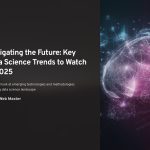 As we approach 2025, the data science landscape is evolving rapidly, driven by technological advancements and the increasing demand for data-driven insights. Professionals in the field must stay informed about emerging trends to maintain a competitive edge and harness the full potential of data science in various industries.
As we approach 2025, the data science landscape is evolving rapidly, driven by technological advancements and the increasing demand for data-driven insights. Professionals in the field must stay informed about emerging trends to maintain a competitive edge and harness the full potential of data science in various industries.

Integration of AI Agents in Data Processes
Artificial Intelligence (AI) agents are becoming integral to data science workflows, automating tasks that traditionally required human intervention. These agents can independently perform data cleaning, analysis, and even generate insights, thereby enhancing efficiency and accuracy in data-driven decision-making. The rise of AI agents is poised to revolutionize how organizations approach data science, enabling more autonomous and intelligent systems.

Emphasis on Synthetic Data Generation
With the growing concerns around data privacy and the need for extensive datasets to train machine learning models, synthetic data generation has emerged as a critical trend. Synthetic data mimics real-world data without compromising individual privacy, allowing data scientists to develop robust models while adhering to ethical standards. This approach not only mitigates privacy risks but also addresses data scarcity issues in various domains.

Rise of Small Language Models (sLMs)
While large language models (LLMs) have garnered significant attention, there’s a shifting focus towards Small Language Models (sLMs) that are more efficient and require fewer computational resources. sLMs are tailored for specific tasks, making them suitable for organizations with limited infrastructure. Their adaptability and cost-effectiveness make sLMs a valuable asset in the data science toolkit.

Adoption of Composite AI Techniques
Composite AI refers to the combination of multiple AI techniques to achieve more accurate and comprehensive results. By integrating methods such as machine learning, natural language processing, and computer vision, data scientists can tackle complex problems more effectively. This holistic approach leverages the strengths of various AI methodologies, leading to enhanced performance and deeper insights.

Focus on Data-Centric Culture
Organizations are increasingly recognizing the importance of fostering a data-centric culture, where data-driven decision-making is embedded into the core business strategy. This involves investing in data literacy programs, promoting cross-functional collaboration, and ensuring that data governance policies are in place. A strong data-centric culture empowers organizations to leverage data as a strategic asset, driving innovation and competitive advantage.

Increased Attention to Data Ethics and Govdata science trends 2025ernance
As data collection and analysis become more pervasive, ethical considerations and governance frameworks are gaining prominence. Issues such as bias in AI models, data privacy, and transparency are at the forefront of discussions. Data scientists and organizations must prioritize ethical practices and establish robust governance structures to maintain trust and compliance in their data initiatives.
*Capturing unauthorized images is prohibited*


